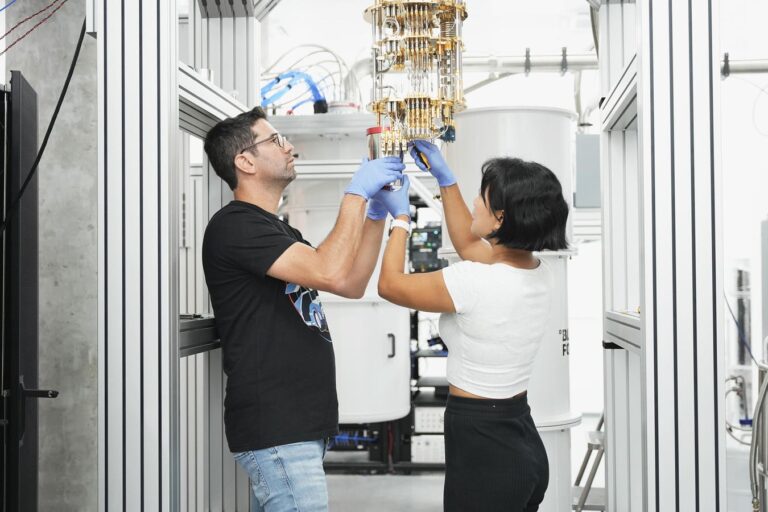Quantum computers at the Israel Quantum Computing Center (IQCC).
quantum machine
“Quantum technology represents the biggest paradigm shift in a generation,” says a comprehensive assessment of the current state of quantum computing recently published by quantum research company GQI. GQI analysts say quantum technology will have “pervasive impacts across all industrial sectors,” but all major approaches to quantum computing still face many challenges.
One of these challenges is the increasingly complex calibration requirements for quantum computing systems, which has become a significant bottleneck slowing efforts to scale quantum computing systems. “As we move to systems with thousands of qubits, the challenges become exponentially more difficult than the traditional approach of manual calibration by quantum physicists,” said Yonatan Cohen, co-founder and CTO of Quantum Machines. is simply not compatible with our ambitions for larger quantum computers.”
Quantum Machines, Rigetti Computing, and Nvidia announced today that they have successfully applied AI to automate the calibration of quantum computers. Quantum Elements and Qruise used an AI-powered tool to remotely automate the calibration of a 9-qubit Rigetti quantum processing unit (QPU) integrated with Quantum Machines’ advanced control system and Nvidia DGX Quantum . It is an integrated system of quantum classical computing built by Nvidia using quantum machines and hosted at the Israel Quantum Computing Center (IQCC).
The use of AI tools “could unlock a new wave of algorithmic advances,” the GQI report said. Just as improvements in quantum hardware are expected, improvements in quantum software can also play a role in bridging the gap to quantum practicality. ”
Automating rather than manual calibration shortens the long preparation process for quantum computing systems. Also focused on speed, AWS and Nvidia announced last week that they are partnering to bring Nvidia CUDA-Q, an open source quantum development environment, to Amazon Braket. Braket’s GPU-based simulations demonstrate up to 350x speedup compared to CPU-based simulations, enabling more efficient testing of quantum circuits.
Other major technology vendors are also continuing to accelerate their innovations. Google has teamed up with Nvidia to introduce AlphaQubit, an AI-based decoder that uses simulations on the Eos supercomputer to enhance quantum device design and identify errors in quantum computing on a state-of-the-art basis. precision of art. Microsoft achieved a breakthrough by entangling 24 logical qubits using neutral atomic quantum computing. And IBM has developed a chip with 1,121 qubits.
Investors are paying attention. Venture funding in this space will reach a new level in 2024, according to data from Crunchbase. Quantum computing startups have already raised $1.5 billion in venture funding across 50 deals so far this year, nearly double the $785 million they raised last year.
Similarly, Israel’s quantum computing sector is also experiencing significant growth, according to a recent report from Startup Nation Central. As of August 2024, there were 22 quantum computing startups in Israel, and total funding for the sector in 2024 was already approaching 2023’s annual total by mid-year. “This suggests the possibility of a strong backlash and growing investor confidence in quantum technologies,” the report concludes.
Investing in quantum technology is not just a personal matter. Governments around the world are investing heavily in quantum computing, communications, and sensing. Similar to AI, this is usually described as a competition between two primarily superpowers. Skip Sanzeri, founder and chief operating officer of QuSecure, said China is “positioning itself as a dominant player in cyber and quantum technologies” and is considered a world leader in quantum communications. speak
In response, the newly proposed bipartisan National Quantum Initiative Reauthorization Act would authorize $2.7 billion in federal funding to accelerate quantum research and development at federal science agencies over the next five years. The bill would refocus the National Quantum Initiative from basic research to practical applications and expand it to include other federal agencies, such as the National Institutes of Health (NIH), the Department of State, and the Small Business Administration (SBA). be.
“Quantum computing has the potential to solve complex problems exponentially faster than existing computers,” a U.S. Senate press release states. “This technology has the potential to lead to breakthroughs in drug discovery, weather forecasting, financial and economic modeling, artificial intelligence, cryptography, and other innovations. Quantum sensing applications could help in navigation and tracking, seismic monitoring, infrastructure It can provide more accurate measurements, which are essential for monitoring and geosurveying.”

